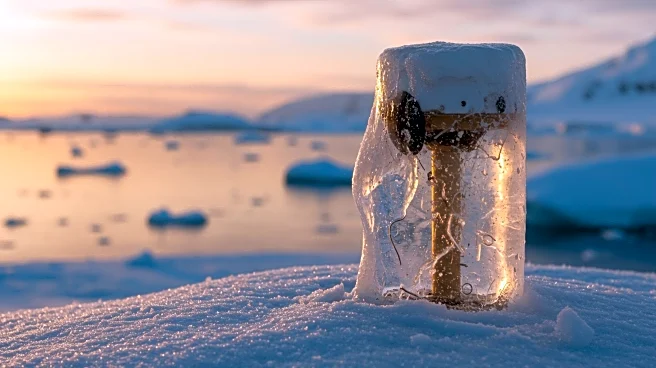What's Happening?
The British Antarctic Survey (BAS) has confirmed the discovery of the remains of Dennis 'Tink' Bell, a British meteorologist who died in Antarctica 66 years ago. Bell, who was 25 at the time, fell into a crevasse on a glacier at Admiralty Bay on King George Island on July 26, 1959. His remains were found by a team from the Henryk Arctowski Polish Antarctic Station on January 19, exposed by a receding glacier. The remains were transported to the Falkland Islands and then to London, where DNA testing at King's College London matched them with samples from Bell's siblings. Bell was part of the Falkland Islands Dependencies Survey and was stationed at Admiralty Bay for a two-year assignment. The discovery brings closure to a decades-long mystery and highlights the human stories in the history of Antarctic science.
Why It's Important?
The discovery of Dennis Bell's remains underscores the impact of climate change, as melting glaciers reveal historical artifacts and remains. This event highlights the ongoing changes in the Antarctic environment, which can have broader implications for global climate patterns. The story also serves as a poignant reminder of the risks faced by early explorers and scientists in harsh conditions, contributing to the legacy of polar research. The recovery of Bell's remains and personal items provides closure to his family and adds to the historical narrative of scientific exploration in Antarctica.
What's Next?
The discovery may prompt further investigations into other historical sites in Antarctica as glaciers continue to recede. It could lead to increased interest in preserving the history of polar exploration and the stories of those who contributed to early scientific efforts. The BAS and other research organizations may continue to monitor and study the effects of climate change on the Antarctic environment, potentially leading to new policies or initiatives aimed at mitigating its impact.
Beyond the Headlines
The ethical considerations of recovering and repatriating remains from remote locations are highlighted by this discovery. It raises questions about how to honor the legacy of individuals who contributed to scientific exploration while respecting their final resting places. Additionally, the event may inspire cultural reflections on the sacrifices made by early explorers and the importance of preserving their stories for future generations.









